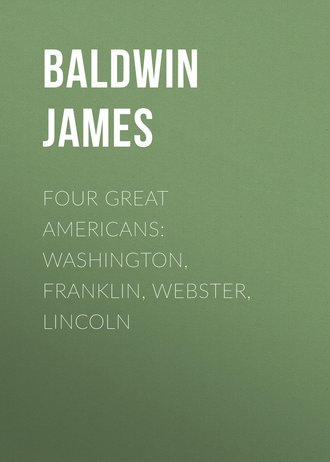
Baldwin James
Four Great Americans: Washington, Franklin, Webster, Lincoln
VIII.—HOW DANIEL TAUGHT SCHOOL
While Daniel Webster was taking his course in college, there was one thing that troubled him very much. It was the thought of his brother Ezekiel toiling at home on the farm.
He knew that Ezekiel had great abilities. He knew that he was not fond of the farm, but that he was anxious to become a lawyer.
This brother had given up all his dearest plans in order that Daniel might be favored; and Daniel knew that this was so.
Once, when Daniel was at home on a vacation, he said, "Zeke, this thing is all wrong. Father has mortgaged the farm for money to pay my expenses at school, and you are making a slave of yourself to pay off the mortgage. It isn't right for me to let you do this."
Ezekiel said, "Daniel, I am stronger than you are, and if one of us has to stay on the farm, of course I am the one."
"But I want you to go to college," said Daniel. "An education will do you as much good as me."
"I doubt it," said Ezekiel; "and yet, if father was only able to send us both. I think that we might pay him back some time."
"I will see father about it this very day," said Daniel.
He did see him.
"I told my father," said Daniel, afterwards, "that I was unhappy at my brother's prospects. For myself, I saw my way to knowledge, respectability, and self-protection. But as to Ezekiel, all looked the other way. I said that I would keep school, and get along as well as I could, be more than four years in getting through college, if necessary, provided he also could be sent to study."
The matter was referred to Daniel's mother, and she and his father talked it over together. They knew that it would take all the property they had to educate both the boys. They knew that they would have to do without many comforts, and that they would have a hard struggle to make a living while the boys were studying.
But the mother said, "I will trust the boys." And it was settled that Ezekiel, too, should have a chance to make his mark in the world.
He was now a grown-up man. He was tall and strong and ambitious. He entered college the very year that Daniel graduated.
As for Daniel, he was now ready to choose a profession. What should it be?
His father wanted him to become a lawyer. And so, to please his parents, he went home and began to read law in the office of a Mr. Thompson, in the little village of Salisbury, which adjoined his father's farm.
The summer passed by. It was very pleasant to have nothing to do but to read. And when the young man grew tired of reading, he could go out fishing, or could spend a day in hunting among the New Hampshire hills.
It is safe to say that he did not learn very much law during that summer.
But there was not a day that he did not think about his brother. Ezekiel had done much to help him through college, and now ought he not to help Ezekiel?
But what could he do?
He had a good education, and his first thought was that he might teach school, and thus earn a little money for Ezekiel.
The people of Fryeburg, in Maine, wanted him to take charge of the academy in their little town. And so, early in the fall, he decided to take up with their offer.
He was to have three hundred and fifty dollars for the year's work, and that would help Ezekiel a great deal.
He bade good-bye to Mr. Thompson and his little law office, and made ready to go to his new field of labor. There were no railroads at that time, and a journey of even a few miles was a great undertaking.
Daniel had bought a horse for twenty-four dollars. In one end of an old-fashioned pair of saddle-bags he put his Sunday clothes, and in the other he packed his books.
He laid the saddle-bags upon the horse, then he mounted and rode off over the hills toward Fryeburg, sixty miles away.
He was not yet quite twenty years old. He was very slender, and nearly six feet in height. His face was thin and dark. His eyes were black and bright and penetrating—no person who once saw them could ever forget them.
Young as he was, he was very successful as a teacher during that year which he spent at Fryeburg. The trustees of the academy were so highly pleased that they wanted him to stay a second year. They promised to raise his salary to five or six hundred dollars, and to give him a house and a piece of land.
He was greatly tempted to give up all further thoughts of becoming a lawyer.
"What shall I do?" he said to himself. "Shall I say, 'Yes, gentlemen,' and sit down here to spend my days in a kind of comfortable privacy?"
But his father was anxious that he should return to the study of the law. And so he was not long in making up his mind.
In a letter to one of his friends he said: "I shall make one more trial of the law in the ensuing autumn.
"If I prosecute the profession, I pray God to fortify me against its temptations. To be honest, to be capable, to be faithful to my client and my conscience."
Early the next September, he was again in Mr. Thompson's little law office. All the money that he had saved, while at Fryeburg, was spent to help Ezekiel through college.
* * * * *
IX.—DANIEL GOES TO BOSTON
For a year and a half, young Daniel Webster stayed in the office of Mr. Thompson. He had now fully made up his mind as to what profession he would follow; and so he was a much better student than he had been before.
He read many law books with care. He read Hume's History of England, and spent a good deal of time with the Latin classics.
"At this period of my life," he afterwards said, "I passed a great deal of time alone.
"My amusements were fishing and shooting and riding, and all these were without a companion. I loved this solitude then, and have loved it ever since, and love it still."
The Webster family were still very poor. Judge Webster was now too old to do much work of any kind. The farm had been mortgaged for all that it was worth. It was hard to find money enough to keep Daniel at his law studies and Ezekiel in college.
At last it became necessary for one of the young men to do something that would help matters along. Ezekiel decided that he would leave college for a time and try to earn enough money to meet the present needs of the family. Through some of his friends he obtained a small private school in Boston.
There were very few pupils in Ezekiel Webster's school. But there were so many branches to be taught that he could not find time to hear all the recitations. So, at last, he sent word to Daniel to come down and help him. If Daniel would teach an hour and a half each day, he should have enough money to pay his board.
Daniel was pleased with the offer. He had long wanted to study law in Boston, and here was his opportunity. And so, early in March, 1804, he joined his brother in that city, and was soon doing what he could to help him in his little school.
There was in Boston, at that time, a famous lawyer whose name was Christopher Gore. While Daniel Webster was wondering how he could best carry on his studies in the city, he heard that Mr. Gore had no clerk in his office.
"How I should like to read law with Mr. Gore!" he said to Ezekiel.
"Yes," said Ezekiel. "You could not want a better tutor."
"I mean to see him to-day and apply for a place in his office," said Daniel.
It was with many misgivings that the young man went into the presence of the great lawyer. We will let him tell the story in his own words:
"I was from the country, I said;—had studied law for two years; had come to Boston to study a year more; had heard that he had no clerk; thought it possible he would receive one.
"I told him that I came to Boston to work, not to play; was most desirous, on all accounts, to be his pupil; and all I ventured to ask at present was, that he would keep a place for me in his office, till I could write to New Hampshire for proper letters showing me worthy of it."
Mr. Gore listened to this speech very kindly, and then bade Daniel be seated while he should have a short talk with him.
When at last the young man rose to go, Mr. Gore said: "My young friend, you look as if you might be trusted. You say you came to study and not to waste time. I will take you at your word. You may as well hang up your hat at once."
And this was the beginning of Daniel Webster's career in Boston.
He must have done well in Mr. Gore's office; for, in a few months, he was admitted to the practice of law in the Court of Common Pleas in Boston.
It was at some time during this same winter that Daniel was offered the position of clerk in the County Court at home. His father, as you will remember, was one of the judges in this court, and he was very much delighted at the thought that his son would be with him.
The salary would be about fifteen hundred dollars a year—and that was a great sum to Daniel as well as to his father. The mortgage on the farm could be paid off; Ezekiel could finish his course in college; and life would be made easier for them all.
At first Daniel was as highly pleased as his father. But after he had talked with Mr. Gore, he decided not to accept the offered position.
"Your prospects as a lawyer," said Mr. Gore, "are good enough to encourage you to go on. Go on, and finish your studies. You are poor enough, but there are greater evils than poverty. Live on no man's favor. Pursue your profession; make yourself useful to your friends and a little formidable to your enemies, and you have nothing to fear."
A few days after that, Daniel paid a visit to his father. The judge received him very kindly, but he was greatly disappointed when the young man told him that he had made up his mind not to take the place.
With his deep-set, flashing eyes, he looked at his son for a moment as though in anger. Then he said, very slowly:
"Well, my son, your mother has always said that you would come to something or nothing—she was not sure which. I think you are now about settling that doubt for her."
A few weeks after this, Daniel, as I have already told you, was admitted to the bar in Boston. But he did not think it best to begin his practice there.
He knew how anxious his father was that he should be near him. He wanted to do all that he could to cheer and comfort the declining years of the noble man who had sacrificed everything for him. And so, in the spring of 1805, he settled in the town of Boscawen, six miles from home, and put up at his office door this sign:
D. WEBSTER, ATTORNEY
* * * * *
X.—LAWYER AND CONGRESSMAN
When Daniel Webster had been in Boscawen nearly two years, his father died. It was then decided that Ezekiel should come and take charge of the home farm, and care for their mother.
Ezekiel had not yet graduated from college, but he had read law and was hoping to be admitted to the bar. He was a man of much natural ability, and many people believed that he would some day become a very famous lawyer.
And so, in the autumn of 1807, Daniel gave up to his brother the law business which he had in Boscawen, and removed to the city of Portsmouth.
He was now twenty-five years old. In Portsmouth he would find plenty of work to do; it would be the very kind of work that he liked. He was now well started on the road towards greatness.
The very next year, he was married to Miss Grace Fletcher, the daughter of a minister in Hopkinton. The happy couple began housekeeping in a small, modest, wooden house, in Portsmouth; and there they lived, very plainly and without pretension, for several years.
Mr. Webster's office was "a common, ordinary-looking room, with less furniture and more books than common. He had a small inner room, opening from the larger, rather an unusual thing."
It was not long until the name of Daniel Webster was known all over New Hampshire. Those who were acquainted with him said that he was the smartest young lawyer in Portsmouth. They said that if he kept on in the way that he had started, there were great things in store for him.
The country people told wonderful stories about him. They said that he was as black as a coal—but of course they had never seen him. They believed that he could gain any case in court that he chose to manage—and in this they were about right.
There was another great lawyer in Portsmouth. His name was Jeremiah Mason, and he was much older than Mr. Webster. Indeed, he was already a famous man when Daniel first began the practice of law.
The young lawyer and the older one soon became warm friends; and yet they were often opposed to each other in the courts. Daniel was always obliged to do his best when Mr. Mason was against him. This caused him to be very careful. It no doubt made him become a better lawyer than he otherwise would have been.
While Webster was thus quietly practicing law in New Hampshire, trouble was brewing between the United States and England. The English were doing much to hinder American merchants from trading with foreign countries.
They claimed the right to search American vessels for seamen who had deserted from the British service. And it is said that American sailors were often dragged from their own vessels and forced to serve on board the English ships.
Matters kept getting worse and worse for several years. At last, in June, 1812, the United States declared war against England.
Daniel Webster was opposed to this war, and he made several speeches against it. He said that, although we had doubtless suffered many wrongs, there was more cause for war with France than with England. And then, the United States had no navy, and hence was not ready to go to war with any nation.
Webster's influence in New Hampshire was so great that he persuaded many of the people of that state to think just as he thought on this subject. They nominated him as their representative in Congress; and when the time came, they elected him.
It was on the 24th of May, 1813, that he first took his seat in Congress. He was then thirty-one years old.
In that same Congress there were two other young men who afterwards made their names famous in the history of their country. One was Henry Clay, of Kentucky. The other was John C. Calhoun, of South Carolina. Both were a little older than Webster; both had already made some mark in public life; and both were in favor of the war.
During his first year in Congress, Mr. Webster made some stirring speeches in support of his own opinions. In this way, as well by his skill in debate, he made himself known as a young man of more than common ability and promise.
Chief Justice Marshall, who was then at the head of the Supreme Court of the United States, said of him: "I have never seen a man of whose intellect I had a higher opinion."
In 1814, the war that had been going on so long came to an end. But now there were other subjects which claimed Mr. Webster's attention in Congress.
Then, as now, there were important questions regarding the money of the nation; and upon these questions there was great difference of opinion. Daniel Webster's speeches, in favor of a sound currency, did much to maintain the national credit and to save the country from bankruptcy.
The people of New Hampshire were so well pleased with the record which he made in Congress that, when his first term expired, they re-elected him for a second.
* * * * *
XI.—THE DARTMOUTH COLLEGE CASE
In 1816, before his second term in Congress had expired, Daniel Webster removed with his family to Boston. He had lived in Portsmouth nine years, and he now felt that he needed a wider field for the exercise of his talents.
He was now no longer the slender, delicate person that he had been in his boyhood and youth. He was a man of noble mien—a sturdy, dignified personage, who bore the marks of greatness upon him.
People said, "When Daniel Webster walked the streets of Boston, he made the buildings look small."
As soon as his term in Congress had expired, he began the practice of law in Boston.
For nearly seven years he devoted himself strictly to his profession. Of course, he at once took his place as the leading lawyer of New England.
Indeed, he soon became known as the ablest counsellor and advocate in America.
The best business of the country now came to him. His income was very large, amounting to more than $20,000 a year.
And during this time there was no harder worker than he. In fact, his natural genius could have done but little for him, had it not been for his untiring industry.
One of his first great victories in law was that which is known as the Dartmouth College case. The lawmakers of New Hampshire had attempted to pass a law to alter the charter of the college. By doing this they would endanger the usefulness and prosperity of that great school, in order to favor the selfish projects of its enemies.
Daniel Webster undertook to defend the college. The speech which he made before the Supreme Court of the United States was a masterly effort.
"Sir," he said, "you may destroy this little institution—it is weak, it is in your hands. I know it is one of the lesser lights in the literary horizon of our country. You may put it out.
"But if you do so, you must carry through your work! You must extinguish, one after another, all those greater lights of science which, for more than a century, have thrown their light over our land!"
He won the case; and this, more than anything else, helped to gain for him the reputation of being the ablest lawyer in the United States.
* * * * *
XII.—WEBSTER'S GREAT ORATIONS
In 1820, when he was thirty-eight years old, Daniel Webster was chosen to deliver an oration at a great meeting of New Englanders at Plymouth, Massachusetts.
Plymouth is the place where the Pilgrims landed in 1620. Just two hundred years had passed since that time, and this meeting was to celebrate the memory of the brave men and women who had risked so much to found new homes in what was then a bleak wilderness.
The speech which Mr. Webster delivered was one of the greatest ever heard in America. It placed him at once at the head of American orators.
John Adams, the second president of the United States, was then living, a very old man. He said, "This oration will be read five hundred years hence with as much rapture as it was heard. It ought to be read at the end of every century, and, indeed, at the end of every year, forever and ever."
But this was only the first of many great addresses by Mr. Webster. In 1825, he delivered an oration at the laying of the cornerstone of the Bunker Hill monument. Eighteen years later, when that monument was finished, he delivered another. Many of Mr. Webster's admirers think that these two orations are his masterpieces.
On July 4th, 1826, the United States had been independent just fifty years. On that day there passed away two of the greatest men of the country—John Adams and Thomas Jefferson.
Both were ex-presidents, and both had been leaders in the councils of the nation. It was in memory of these two patriots that Daniel Webster was called to deliver an oration in Faneuil Hall, Boston.
No other funeral oration has ever been delivered in any age or country that was equal to this in eloquence. Like all his other discourses, it was full of patriotic feeling.
"This lovely land," he said, "this glorious liberty, these benign institutions, the dear purchase of our fathers, are ours; ours to enjoy, ours to preserve, ours to transmit. Generations past and generations to come hold us responsible for this sacred trust.
"Our fathers, from behind, admonish us with their anxious, paternal voices; posterity calls out to us from the bosom of the future; the world turns hither its solicitous eyes; all, all conjure us to act wisely and faithfully in the relation which we sustain."
Most of his other great speeches were delivered in Congress, and are, therefore, political in tone and subject.
Great as Daniel Webster was in politics and in law, it is as an orator and patriot that his name will be longest remembered.
* * * * *
XIII.—MR. WEBSTER IN THE SENATE
When Daniel Webster was forty years old, the people of Boston elected him to represent them in Congress. They were so well pleased with all that he did while there, that they re-elected him twice.
In June, 1827, the legislature of Massachusetts chose him to be United States senator for a term of six years. He was at that time the most famous man in Massachusetts, and his name was known and honored in every state of the Union.
After that he was re-elected to the same place again and again; and for more than twenty years he continued to be the distinguished senator from Massachusetts.
I cannot now tell you of all his public services during the long period that he sat in Congress. Indeed, there are some things that you would find hard to understand until you have learned more about the history of our country. But you will by-and-by read of them in the larger books which you will study at school; and, no doubt, you will also read some of his great addresses and orations.
It was in 1830 that he delivered the most famous of all his speeches in the senate chamber of the United States. This speech is commonly called, "The Reply to Hayne."
I shall not here try to explain the purport of Mr. Hayne's speeches—for there were two of them. I shall not try to describe the circumstances which led Mr. Webster to make his famous reply to them.
But I will quote Mr. Webster's closing sentences. Forty years ago the school-boys all over the country were accustomed to memorize and declaim these patriotic utterances.
"When my eyes shall be turned to behold, for the last time, the sun in heaven, may I not see him shining on the broken and dishonored fragments of a once glorious Union; on states dissevered, discordant, belligerent, on a land rent with civil feuds, or drenched, it may be, in fraternal blood!
"Let their last feeble and lingering glance rather behold the gorgeous ensign of the republic, now known and honored throughout the earth, still high advanced, its arms and trophies streaming in their original lustre, not a stripe erased or polluted, not a single star obscured, bearing for its motto no such miserable interrogatory, 'What is all this worth?' nor those other words of delusion and folly, 'Liberty first and Union afterwards;' but everywhere, spread all over in characters of living light, blazing on all its folds, as they float over the land, and in every wind under the whole heavens, that other sentiment, dear to every American heart—Liberty and Union, now and forever, one and inseparable!"
In 1841, Daniel Webster resigned his seat in the senate. He did this in order to become secretary of state in the cabinet of the newly elected president, William Henry Harrison.
But President Harrison died on the 5th of April, after having held his office just one month; and his place was taken by the vice-president, John Tyler. Mr. Webster now felt that his position in the cabinet would not be a pleasant one; but he continued to hold it for nearly two years.
His most important act as secretary of state was to conclude a treaty with England which fixed the northeastern boundary of the United States. This treaty is known in history as the Ashburton Treaty.
In 1843, Mr. Webster resigned his place in President Tyler's cabinet. But he was not allowed to remain long in private life. Two years later he was again elected to the United States senate.
About this time, Texas was annexed to the United States. But Mr. Webster did not favor this, for he believed that such an act was contrary to the Constitution of our country.
He did all that he could to keep our government from making war upon Mexico. But after this war had been begun, he was a firm friend of the soldiers who took part in it, and he did much to provide for their safety and comfort.
Among these soldiers was Edward, the second son of Daniel Webster. He became a major in the main division of the army, and died in the City of Mexico.






